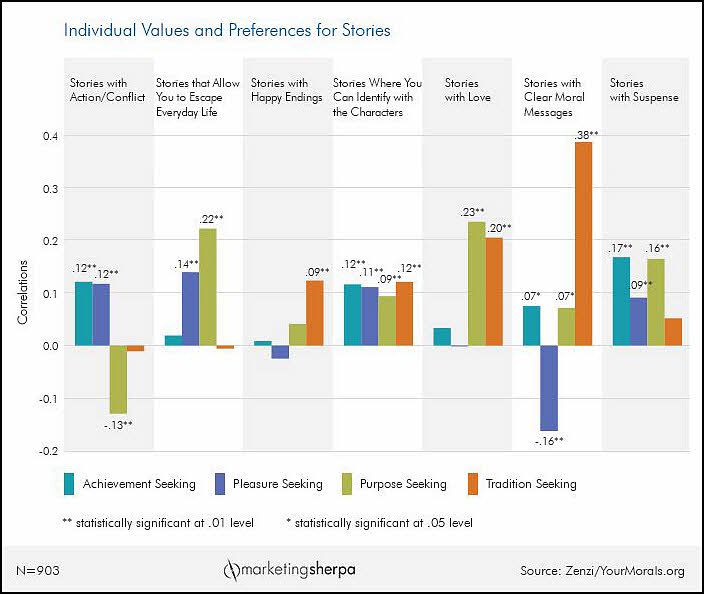by
Dr. Liva LaMontagne , Editorial Research Manager
From January 2012 to March 2013, a group of professors and graduate students studying social psychology at the University of Virginia, The University of California, Irvine and the University of Southern California set up the site YourMorals.org and surveyed visitors on their values and attitudes.
Zenzi, a values-based marketing agency, analyzed data from 903 visitors to the site and looked at their individual values and preferences for stories.

Click here to see a printable version of this chart
It found that people can be classified by what they "seek":
- Tradition seekers — people who are family-oriented, are typically older and politically conservative, brand loyal, swayed by advertising and prefer direct mail
- Purpose seekers — people who are compassionate and cooperative, eco-conscious, research before purchasing and like to shop "local"
- Achievement seekers — people who are active on social media, tech savvy, brand conscious, driven by success and achievement oriented
- Pleasure seekers — people who value fun and excitement, are not concerned with price, brand loyalty or safety, like to stand out from the crowd and are socially active
Zenzi found that tradition seekers prefer stories with a clear moral message. Meanwhile, purpose seekers prefer stories that let them escape everyday life. Both purpose seekers and achievement seekers enjoy stories with suspense.
On the other hand, pleasure seekers are turned off by stories with direct moral messages, and purpose seekers dislike stories with lots of conflict.
These findings are not surprising, since customers’ personalities affect their preferences for messages. We know from
previous research that a personality fit between the message and the customer can increase a customer's online buying.
The more challenging questions are, how can marketers use certain customer ideals in their storytelling without alienating customers with different values? How should marketers assess the individual attitudes of customers to determine which stories resonate with them?
Ravi Iyer, Data Scientist, Zenzi, and Robert Rose, Chief Strategy Officer, Content Marketing Institute, offered the following three insights.
Value-based storytelling can narrow your audience
Rose mentioned that marketers don’t typically have the luxury of focusing on one set of values across their audience.
"With notable exceptions (nonprofits, political campaigns, etc.) most marketers are going to have to appeal to many different groups with varying values — certainly initially," he said.
On the other hand, Iyer stressed using opportunities to target a specific segment, or the right audience for a brand, by using the same narrative tools that movie makers and game developers use combined with data.
"For example, a game like 'Grand Theft Auto,' with its ambiguous moral message, will clearly turn off a large number of people, but there is an audience for such narratives ... data can enable people to reach them," he said.
Creating brand value through storytelling
"What comes first? The value magnet of the brand or the story that creates the magnet?" Rose said.
He posited that marketers create their brand (or stories) with a broad purpose in mind. This aspiration (e.g., Macs were for "creative people" and PCs were for nerds who wanted to "customize") attracts people who naturally fit other values which were wholly unintended (e.g., it just so happens that creative people are more liberal).
"I wonder if we can actually predetermine the values we are going to attract by telling that story. I think there are too many elements that are unknown to the storyteller at the time of telling," Rose said.
He added that understanding what resonates with different types of audiences can be very helpful in determining the direction marketers want to take their content as they try to align content marketing values with the broader brand value. He cautioned marketers from getting so caught up in the analysis of data that it "prevents a creative spark from being lit."
How to measure consumer values
Iyer mentioned that information such as where a company's best customers are located (for instance, knowing if they are in liberal cities or rural areas) or what words the companies followers use on social media (via text analytics) can be quite predictive.
"And of course, psychologists have a long tradition of using surveys so traditional survey methodologies can be used as well," he added.
Rose mentioned that marketers rely too often on competitive research, consumer data and technology-gathered data as methods to learn about their customers.
"Understanding the values of customers means taking the time to sit down with them, know them as people and adding to the collective value of where we want to take them on their journey with our brand," Rose said.
To sum up, targeting people with specific values will narrow your audience, so you need to make sure you have a solid understanding of what your ideal prospects value. You can infer your customers’ and prospects’ values by their location data, digital footprints and by asking them to fill out surveys.
Related Resources
Get the first look at the MarketingSherpa Customer Survey results by sharing your expertise in
the 2015 MarketingSherpa Marketing Practices Survey Insights (from Zenzi)
Ingenious Storytelling Gets Great Response From Science Nerds (by Ardath Albee, Content Marketing Institute)
Why Your Brain Loves Good Storytelling (By Paul J. Zak, Harvard Business Review)
Ecommerce Marketing: 150% increase in sales from product storytelling and site redesign Digital Analytics: How to use data to tell your marketing story (From the MarketingExperiments blog)
Subscribe to the MarketingSherpa Chart of the Week — get the data and discoveries you need to better serve customers and improve results, delivered straight to your inbox
Get inspired by content and social marketing case studies at the
MarketingSherpa Summit 2016 in Las Vegas










